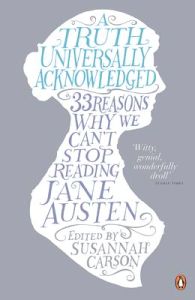 I’m making my (very pleasant) way through A Truth Universally Acknowledged – 33 Reasons why we can’t stop reading Jane Austen at the moment. I picked it up in London in March – at the British Library bookshop. Edited by Susannah Carson, it contains 33 essays on the topic of reading Jane Austen, as well as a foreword by Harold Bloom and an introduction by Susannah Carson – also on reading Jane Austen, naturally. So far it is excellent, the only problem being the urge it creates to read Jane Austen rather than read about reading Jane Austen, but it’s a problem I can live with. I do suspect my next read will be one of the novels, though…
I’m making my (very pleasant) way through A Truth Universally Acknowledged – 33 Reasons why we can’t stop reading Jane Austen at the moment. I picked it up in London in March – at the British Library bookshop. Edited by Susannah Carson, it contains 33 essays on the topic of reading Jane Austen, as well as a foreword by Harold Bloom and an introduction by Susannah Carson – also on reading Jane Austen, naturally. So far it is excellent, the only problem being the urge it creates to read Jane Austen rather than read about reading Jane Austen, but it’s a problem I can live with. I do suspect my next read will be one of the novels, though…
Today’s taster is from the first essay, by Susanna Clarke, putting into words something that has bothered me too about the way people talk about Darcy:
Darcy has somehow been redefined in recent years as a dark, brooding, romantic hero. I’ve seen him mentioned with Heathcliff and Mr. Rochester as if they were all points on the same spectrum. But that’s not how Elizabeth or Jane Austen sees him. When Elizabeth thinks Darcy is arrogant, she isn’t attracted to him. She turns him down. It’s only when she sees him as a kind friend, a caring brother, and a good master that she begins to fall in love with him. If he makes other people happy, then he is capable of making her happy too. I doubt that Elizabeth is secretly or subconsciously attracted to a «dark» Darcy. Twenty-first-century women (and men) can afford to romanticize dark heroes because their fates and futures are in their own hands — Elizabeth didn’t have that option.
(p. 5)
More tasters can be found at Flukten fra virkeligheten.
